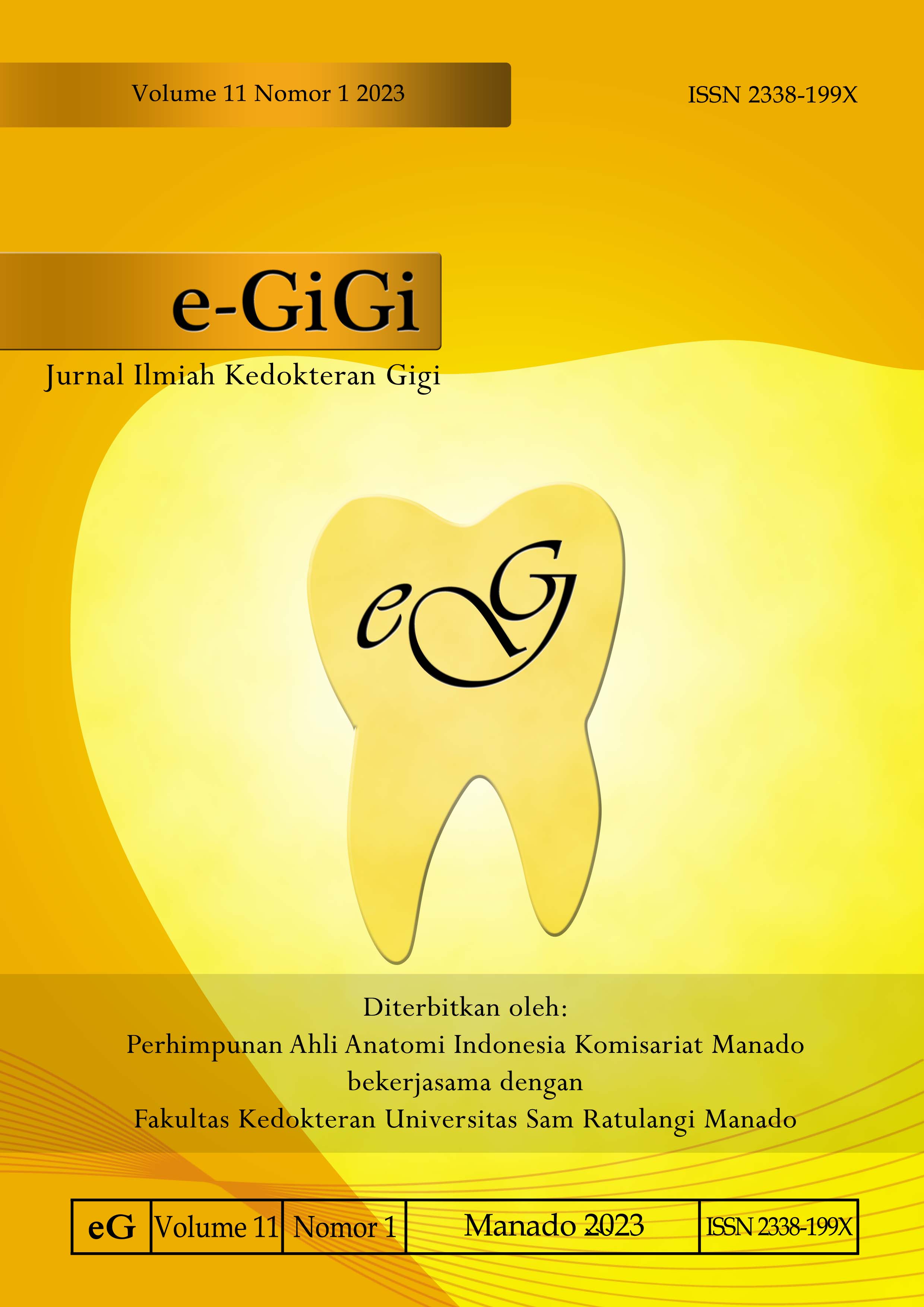Efek Ekstrak Daun Oregano (Origanum vulgare) terhadap Plat Resin Akrilik Heat-Cured yang Dikontaminasi Candida albicans dan Streptococcus mutans
DOI:
https://doi.org/10.35790/eg.v11i1.44461Abstract
Abstract: Long-term use of dentures with poor cleaning can cause denture stomatitis mainly due to Candida albicans and Streptococcus mutans. Oregano leaf (Origanum vulgare) which contains a variety of active components is believed to be an alternative of denture cleansers. This study aimed to determine the effect of oregano leaf extract on heat-cured acrylic resin plates contaminated with C. albicans and S. mutans. There were 27 heat-cured acrylic plates contaminated and soaked for 10 minutes in nine treatment groups, as follows: oregano leaf extract of 50 mg/ml, 25 mg/ml, 12.5 mg/ml, 6.25 mg/ml, 3,125 mg /ml, 1,562 mg/ml, and 0,781 mg/ml, distilled water as the negative control, Polident denture cleanser fresh (positive control for C. albicans) and chlorhexidine gluconate 0,2% (positive control for S. mutans). The colony number of C. albicans and the inhibition zones of S. mutans were counted. The results showed that the lowest number of C. albicans colony and the largest inhibition zone for S. mutans were at the concentration of 50 mg/ml oregano leaf extract. In conclusion, there was an effect of oregano leaf extract on acrylic resin plates contaminated with Candida albicans and Streptococcus mutans.
Keywords: acrylic resin; denture stomatitis; Origanum vulgare; Candida albicans; Streptococcus mutans
Abstrak: Penggunaan gigi tiruan secara terus menerus dalam jangka panjang dengan pembersihan yang buruk dapat menyebabkan denture stomatitis terutama oleh Candida albicans dan Strepto-coccus mutans. Daun oregano (Origanum vulgare) yang mengandung beragam komponen aktif diyakini dapat menjadi alternatif pembersih gigi tiruan. Penelitian ini bertujuan untuk mengetahui pengaruh ekstrak daun oregano terhadap plat resin akrilik heat-cured yang dikontaminasi jamur C. albicans dan S. mutans. Terdapat 27 plat akrilik heat-cured yang dikontaminasi dan dilakukan perendaman selama 10 menit dalam sembilan kelompok perlakuan yaitu, konsentrasi ekstrak daun oregano 50 mg/ml, 25 mg/ml, 12,5 mg/ml, 6,25 mg/ml, 3,125 mg/ml, 1,562 mg/ml, 0,781 mg/ml, akuades (kontrol negatif), Polident Denture Cleanser Fresh (kontrol positif C. albicans), dan chlorhexidine gluconate 0,2% (kon-trol positif S. mutans). Jumlah koloni C. albicans dan zona hambat S. mutans dihitung. Hasil penelitian menunjukkan jumlah koloni C. albicans terkecil dan zona hambat S. mutans terbesar pada konsentrasi ekstrak daun oregano 50 mg/ml. Simpulan penelitian ini ialah terdapat pengaruh ekstrak daun oregano terhadap plat resin akrilik yang dikontaminasi Candida albicans dan Streptococcus mutans.
Kata kunci: resin akrilik; denture stomatitis; Origanum vulgare; Candida albicans; Streptococcus mutans
References
Sofya PA, Rahmayani L, Purnama RRC. Effect of soft drink towards heat cured acrylic resin denture base surface roughness. Padjadjaran J Dent. 2017;29(1):58–63.
Subrata G. Antifungal properties of sodium peroxide and sodium hypochlorite as a denture cleanser for full acrylic denture in vitro. Padjadjaran J Dent. 2008;20(1):1–10.
Kristiana D, Praharani D. Influence test of averrhoa bilimbi leaf extract as denture cleanser on the growth of Streptococcus mutans. Padjajaran J Dent. 2011;23(3):195–200.
Mandagi DV, Pangemanan DHC, Siagian KV., Gambaran denture stomatitis pada pengguna gigi tiruan di Kelurahan Winagun Satu Kecamatan Malalayang. Pharmacon. 2016;5(2):29-37.
Zarb GA, Bolender CL, Eckert SE, Jacob RF, Fenton AH, Mericske-Stern R. Prosthodontic Treatment for Edentulous Patients (12th ed). St Louis: Mosby; 2004. p. 201–7.
Ličina BZ, Stefanović OD, Vasić SM, Radojević ID, Dekić MS, Čomić LR. Biological activities of the extracts from wild growing Origanum vulgare L. Food Control. 2013;33(2):498–504.
Pezzani R, Vitalini S, Iriti M. Bioactivities of Origanum vulgare L.: an update. Phytochem Rev. 2017;16(6):1253–68.
De Santis F, Poerio N, Gismondi A, Nanni V, Di Marco G, Nisini R, et al. Hydroalcoholic extract from Origanum vulgare induces a combined anti-mycobacterial and anti-inflammatory response in innate immune cells. PLoS ONE. 2019;14(3):1-19.
Cleff MB, Meinerz AR, Xavier M, Schuch LF, Meireles MCA, Rodrigues MRA, et al. In vitro activity of Origanum vulgare essential oil against Candida species. Brazilian J Microbiol. 2010;41(1): 116–23.
Wahyuningtyas E. Pengaruh ekstrak Graptophyllum pictum terhadap pertumbuhan Candida albicans pada plat gigi tiruan resin akrilik. Indones J Dent. 2008;15(3):187–91.
Rahman E. Efektivitas ekstrak daun dewa (Gynura pseudochina (Lour.) DC) terhadap pertumbuhan Candida albicans pada plat dasar gigi tiruan resin akrilik. Majalah Ilmiah Sultan Agung. 2010;48(123):1–13.
Ngazizah FN, Ekowati N, Septiana AT. Potensi daun trembilungan (Begonia hirtella Link) sebagai Antibakteri dan antifungi. Biosfera. 2016;33(3):126–33.
Aboody MS Al, Mickymaray S. Anti-fungal efficacy and mechanisms of flavonoids. Antibiotics. 2020;9(2):1–45.
Septiadi T, Pringgenies D, Karna Radjasa O. Uji fitokimia dan aktivitas antijamur ekstrak teripang keling (Holoturia atra) dari pantai Bandengan Jepara terhadap jamur Candida albicans. J Mar Res [Internet]. 2013;2(2):76–84. Available from: http://marefateadyan.nashriyat.ir/node/150
Manik DF, Hertiani T, Anshory H. Analisi korelasi antara kadar flavonoid dengan aktivitas antibakteri ekstrak etanol dan fraksi-fraksi daun kersen (Muntingia calabura L.) terhadap Staphylococcus aureus. Khazanah. 2014;6(2):1-11.
Downloads
Published
How to Cite
Issue
Section
License
Copyright (c) 2023 Silvia Naliani, Shelly Lelyana, Henry Y. Mandalas, Jason F. Laurence, Vinna K. Sugiaman, Jane A. V. Wibisono, Dian Lesmana

This work is licensed under a Creative Commons Attribution-NonCommercial 4.0 International License.
COPYRIGHT
Authors who publish with this journal agree to the following terms:
Authors hold their copyright and grant this journal the privilege of first publication, with the work simultaneously licensed under a Creative Commons Attribution License that permits others to impart the work with an acknowledgment of the work's origin and initial publication by this journal.
Authors can enter into separate or additional contractual arrangements for the non-exclusive distribution of the journal's published version of the work (for example, post it to an institutional repository or publish it in a book), with an acknowledgment of its underlying publication in this journal.
Authors are permitted and encouraged to post their work online (for example, in institutional repositories or on their website) as it can lead to productive exchanges, as well as earlier and greater citation of the published work (See The Effect of Open Access).






